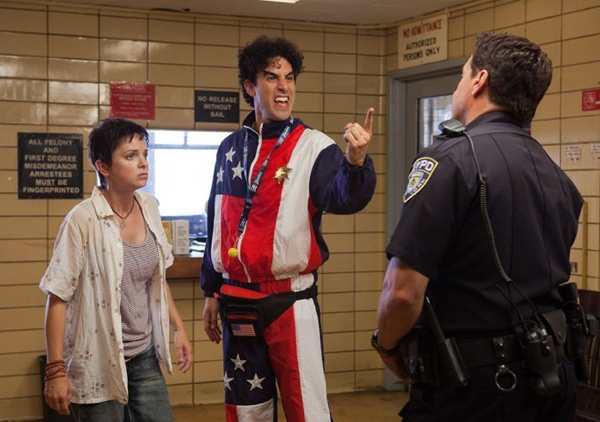Movie review by Greg Carlson
Less successful than “Borat” and “Bruno,” Sacha Baron Cohen’s “The Dictator” trades the ambush mockumentary for the more predictable terrain of fully-scripted narrative. Opening with a dedication to Kim Jong-il, Baron Cohen and director/regular collaborator Larry Charles establish Admiral General Hafez Aladeen, the ruler of the fictional North African Republic of Wadiya, as a composite of narcissistic strongmen like Muammar Gadaffi and Saddam Hussein (rather brilliantly, an early item in “The Hollywood Reporter” stated that “The Dictator” was inspired by Saddam’s novel “Zabibah and the King”). Aladeen’s boorish behavior is matched by his penchant for garish military costumes, and Baron Cohen embraces the considerable challenge of infusing his awful protagonist with glimmers of humanity.
Even though “The Dictator” eliminates the stylistic technique in which unsuspecting victims fall prey to Baron Cohen’s antics, the performer retains the core concept of a fish-out-of-water foreigner whose customs conflict with conventional expectations of polite behavior. Aladeen is, among other unsavory things, a spoiled manchild who uses his wealth and power to buy sexual favors from American celebrities. Ensconced in the sprawl of his opulent quarters, the despot hones his anti-Semitism by gleefully playing a first-person shooter videogame that recreates the murders of Israeli athletes at the 1972 Olympic Games in Munich. If you don’t think that idea is funny, you probably won’t like the extended gag sequence with the decapitated head.
Baron Cohen continues to exploit taboo with an impressive level of confidence for an artist grappling with social and political ideas that share the same space with copious gags revolving around ignorant racism, gruesome torture, pedophilia, sexual assault, and masturbation, to name a few. And while the most indelicate and explicit details of these coarse jokes cannot be located in masterful features like Charles Chaplin’s “The Great Dictator” and the Marx Brothers’ “Duck Soup,” spiritual commonalities are shared by the tremendous Osterlich victory speech delivered by Chaplin’s Jewish barber (disguised as Adenoid Hynkel) and Aladeen’s climactic celebration of the joys of autocracy in which the hypocritical attitudes of the contemporary American political landscape are smartly exposed.
Anna Faris, whose tremendous comic timing is rarely put to good use in a movie worthy of her skill, plays Zoey, a progressive activist who works at a food co-op when she is not attending street demonstrations. Inexplicably, Zoey falls for the abusive Aladeen, whose constant put-downs and insults are either a brutal display of wrongheaded misogyny or a series of pointed barbs at an easily stereotyped segment of feminism (critics Andrew O’Hehir and A.O. Scott apparently disagree on the matter). In either case, Baron Cohen and Charles underutilize Faris, who steals all her scenes and lights up the kind of dialogue that would derail a lesser talent.
Aladeen’s Islamism is only implicitly woven into the fabric of “The Dictator,” and while the lack of specificity might initially suggest a willfully apolitical position, closer examination suggests that Baron Cohen merely continues to do what he has done for close to fifteen years: skewer the jingoistic, the greedy and powerful, and the homophobic and racist by assuming the persona of a character who espouses fealty to those kinds of failings. Not everyone will play along – the conundrum of inhabiting an ignoramus is that a certain segment of the audience won’t recognize the irony and the dissimulation.
